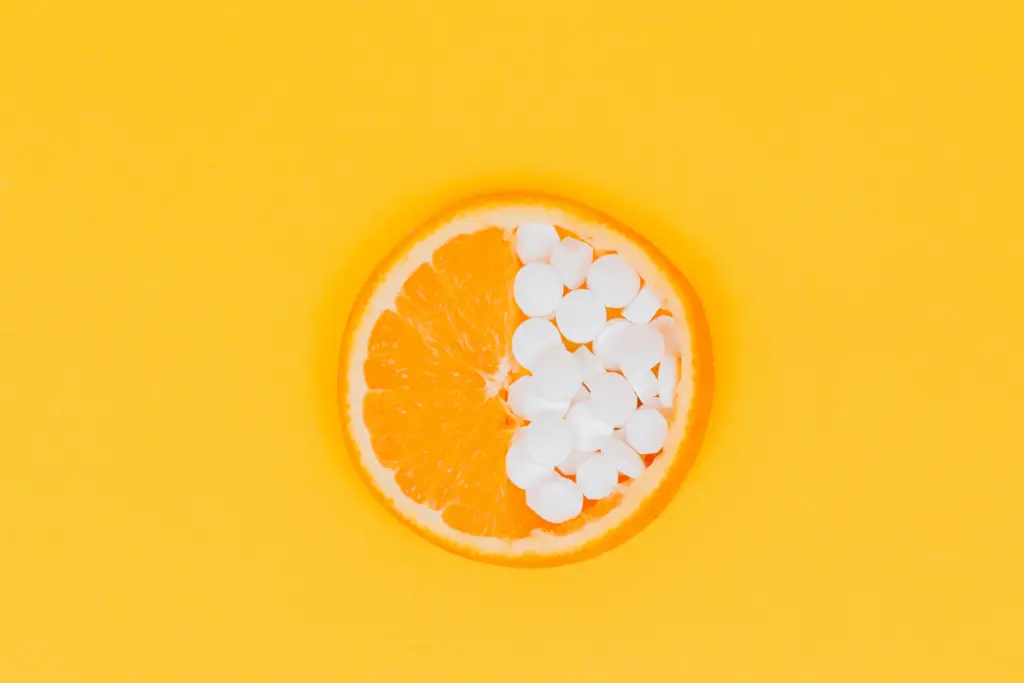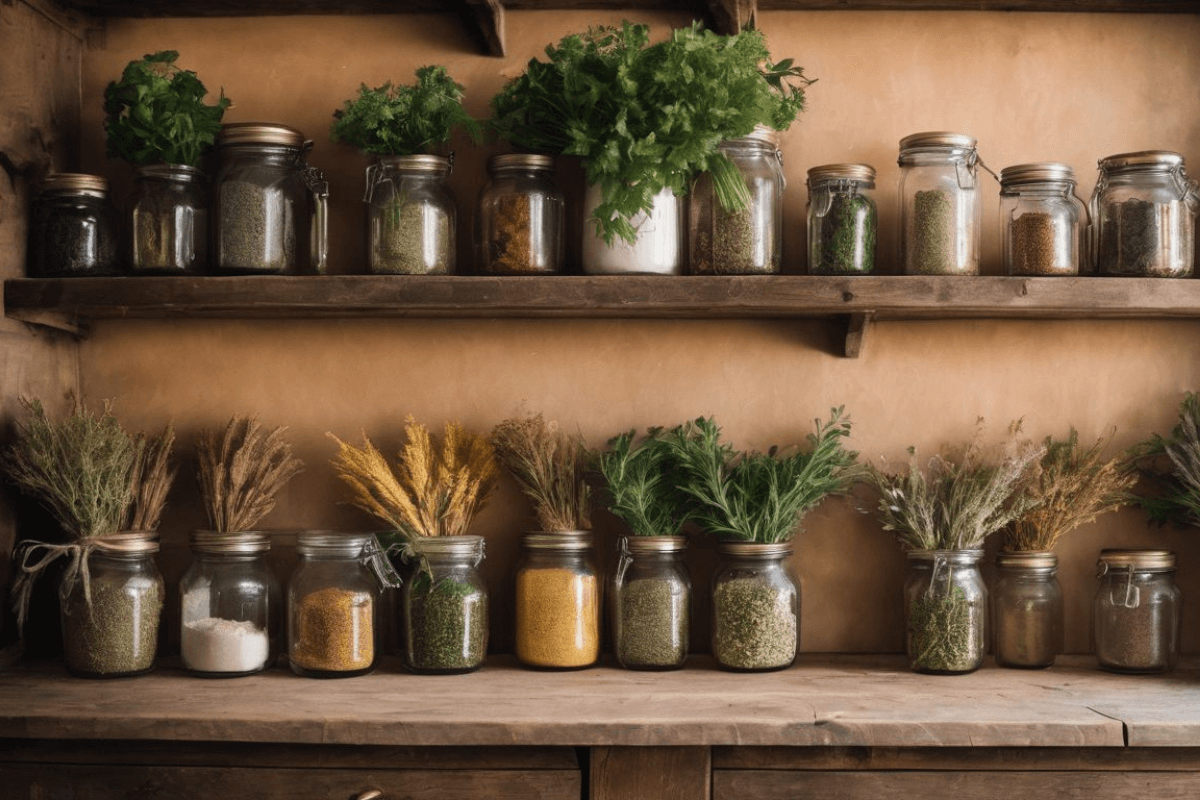TheHerbProf.com is a treasure trove of knowledge for those interested in natural healing and herbal remedies. The website is run by Paul Johnston MD. A naturopathic who has not only received extensive education in the field but also has personal experience in self-healing.
Does the seemingly never-ending list of pharmaceutical medications, all carrying their own daunting set of side effects, make your head spin? I know that feeling well. It’s something I wrestled with until I discovered the transformative powers hidden within natural remedies. If you ever research: Herbs used in herbal medicine you will find a lot of incorrect information.
In this post, we’ll explore the world of herbal medicine together and dig into common herbs and their associated health benefits. So come along as we embark on this insightful journey – nature’s very own pharmacy awaits us!
Common Medicinal Herbs
There are several common medicinal herbs that are widely used in herbal medicine.
Chamomile – Organic Chamomile Flower Whole – Get Yours Here.
Chamomile is an herb that many of us use in our daily routines. For centuries, people have turned to chamomile tea for relaxation and sleep assistance. This aromatic flower has more than just calming properties; it also packs a potent punch as a medicinal herb.
Its healing powers can help soothe skin conditions such as eczema and burns while internally, it aids with various digestive issues like indigestion or gas. From sipping its soothing brew to applying its extract on the skin, chamomile plays an essential role in natural remedies and herbal treatments.
Echinacea – Echinacea Purpurea Herb – Get Yours Here
Echinacea is a popular herb used in herbal medicine for its potential immune-boosting properties. It has been traditionally used to prevent and treat colds, flu, and other respiratory infections.
Echinacea is believed to stimulate the production of white blood cells, which play a crucial role in fighting off pathogens. This herb also contains compounds with anti-inflammatory effects that may help reduce symptoms related to inflammation, such as sore throat or coughing.
Some studies suggest that Echinacea may shorten the duration of common illnesses and lessen the severity of symptoms. However, more research is needed to fully understand its effectiveness and recommended dosage for specific conditions.
In addition to its immune-strengthening benefits, Echinacea has also been explored for its potential antioxidant properties. Antioxidants protect our body from harmful free radicals that contribute to chronic diseases like cancer and heart disease.
Feverfew – Feverfew Herb from Austria – Get Yours Here
Feverfew is a popular herb used in herbal medicine for its potential health benefits. This herb, which is native to Europe, has been traditionally used for centuries to treat various ailments.
Feverfew is commonly known for its ability to help alleviate migraines and headaches. It contains compounds that may reduce inflammation and prevent the release of chemicals in the brain that are thought to trigger migraines.
In addition to its pain-relieving properties, feverfew may also have anti-inflammatory effects, making it beneficial for conditions such as arthritis. This versatile herb can be consumed as a tea or taken in capsule form as an herbal supplement.
Garlic – Garlic Press – Get Yours Here!
Garlic is a powerful herb commonly used in herbal medicine for its numerous health benefits. It contains compounds known as allicin, which have antimicrobial and immune-boosting properties.
Garlic can be beneficial for cardiovascular health by lowering blood pressure and cholesterol levels. Additionally, it may help to prevent certain types of cancer and improve digestion.
Consuming garlic regularly can also support the immune system and reduce the severity of colds and flu.
Ginger
Ginger is a powerful herb used in herbal medicine for its numerous health benefits. It has been traditionally used to soothe digestive issues, such as nausea and indigestion, by promoting healthy digestion and reducing inflammation.
Ginger also possesses anti-inflammatory properties that can help alleviate pain and reduce swelling associated with conditions like arthritis. Additionally, this healing herb supports the immune system and may help fight off infections due to its antimicrobial properties.
Whether consumed as a tea or included in meals, ginger is a versatile herb that can provide natural relief for various ailments.

Ginkgo
Ginkgo, also known as Ginkgo biloba, is an ancient herb that has been used in traditional Chinese medicine for centuries. It is well-known for its potential health benefits and healing properties.
Ginkgo leaves contain powerful antioxidants that can help protect the body against damage from harmful free radicals. These antioxidants may also improve circulation, which can benefit the brain and other vital organs.
Some studies suggest that ginkgo may enhance cognitive function and memory, making it a popular supplement among those looking to boost their mental performance. Additionally, ginkgo has been used to alleviate symptoms of anxiety and depression by promoting a sense of calmness and relaxation.
Ginseng
Ginseng is a popular herb used in herbal medicine for its potential health benefits. This root has been traditionally used to increase energy levels and promote overall well-being.
It is believed to have adaptogenic properties, meaning it may help the body cope with stress and improve mental clarity. Additionally, ginseng may support immune function and enhance physical performance.
Some studies suggest that ginseng may also have anti-inflammatory effects and could potentially lower blood sugar levels. However, it’s important to note that more research is needed to fully understand the effectiveness of ginseng as a medicinal herb.
Goldenseal
Goldenseal is a popular herb used in herbal medicine. It has been traditionally used for its various health benefits. This powerful plant contains berberine, a compound known for its antibacterial and antifungal properties.
Goldenseal is often used to boost the immune system and treat infections, such as colds and respiratory issues. It can also aid in digestive health by reducing inflammation and strengthening the lining of the digestive tract.
Additionally, goldenseal may help regulate blood sugar levels and support liver function. Overall, this versatile herb offers a range of therapeutic properties that make it a valuable addition to herbal treatments.

Milk Thistle – Bronson Milk Thistle – Get Yours Here.
Milk thistle is a popular herb used in herbal medicine. It is known for its liver-supporting properties and has been used for centuries to promote overall liver health. The active ingredient in milk thistle, silymarin, is believed to have antioxidant and anti-inflammatory effects that can help protect the liver from damage caused by toxins or certain medications.
Some studies suggest that milk thistle may also have potential benefits for individuals with liver conditions such as hepatitis or cirrhosis. Additionally, milk thistle may support digestive health and aid in detoxification processes within the body.
Saint John’s Wort – Get Yours Here.
Saint John’s Wort is a well-known herb that has been used in herbal medicine for centuries. It is widely recognized for its potential mood-enhancing properties, making it a popular natural remedy for mild to moderate depression.
Studies have shown that Saint John’s Wort may help increase the levels of certain chemicals in the brain, such as serotonin, which are thought to play a role in regulating mood. Additionally, this herb has also been found to have anti-inflammatory and antioxidant effects, which can contribute to overall health and well-being.
However, it is important to note that Saint John’s Wort may interact with certain medications and should not be taken without consulting a healthcare professional first.
Saw Palmetto
Saw palmetto is a powerful herb commonly used in herbal medicine. It comes from the fruit of the saw palmetto plant, and it has been traditionally used to treat various health conditions.
Saw palmetto is most well-known for its potential benefits in supporting prostate health. It may help reduce symptoms of enlarged prostate, such as frequent urination and difficulty emptying the bladder.
In addition, saw palmetto has anti-inflammatory properties that can help relieve urinary tract inflammation. Some studies suggest that saw palmetto may also have hormonal balancing effects and could be beneficial for hair loss prevention.
Valerian – Valerian Root – Get Yours Here.
Valerian is a popular herb used in herbal medicine for its calming properties. It has been traditionally used to treat anxiety, insomnia, and nervousness. Valerian is believed to work by increasing the levels of gamma-aminobutyric acid (GABA) in the brain, which helps to promote relaxation and reduce stress.
It can be taken as a tea or in supplement form, and it is generally considered safe when used as directed. However, it may cause drowsiness and should not be mixed with sedatives or alcohol.
As always, it’s important to consult with a healthcare professional before adding valerian to your wellness routine.

Health Benefits of Herbal Medicine
Herbal medicine offers numerous health benefits, including immune system support, pain relief, digestive health improvement, mental health enhancement, hormonal balance maintenance, and liver support.
Immune system support
Herbal medicine has been used for centuries to support a healthy immune system. Certain herbs, such as echinacea and garlic, are known for their immune-boosting properties. Echinacea can help increase the activity of white blood cells, which play a crucial role in fighting off infections.
Garlic contains compounds that have antimicrobial and anti-inflammatory effects, making it beneficial for enhancing the body’s defenses against pathogens. Other herbs like ginger and ginseng also have immune-supportive properties that can help strengthen the body’s natural defense mechanisms.
In addition to these specific herbs, herbal medicine as a whole promotes overall wellness by nourishing and balancing the immune system. It focuses on supporting the body’s innate ability to heal itself rather than simply treating symptoms.
Pain relief
Herbal medicine offers a natural approach to pain relief. Many herbs have anti-inflammatory properties that can help reduce pain and inflammation in the body. Some popular choices for pain relief include ginger, turmeric, and devil’s claw.
These herbs can be used topically or taken internally as supplements to alleviate discomfort caused by conditions such as arthritis, muscle strains, or headaches. Incorporating these herbal remedies into your routine may provide you with safe and effective alternatives to over-the-counter or prescription medications for managing pain.
Digestive Health
Maintaining good digestive health is crucial for overall well-being. Herbal medicine offers a variety of natural remedies that can help support and improve the functioning of the digestive system.
Certain herbs like ginger and chamomile have been used for centuries to soothe stomach discomfort and relieve indigestion. Other herbs such as garlic and milk thistle are known to promote healthy digestion by aiding in the breakdown of food and supporting liver function.
Incorporating these herbal treatments into your routine can contribute to better digestive health, helping you feel more comfortable and energized throughout the day.
Mental health
Maintaining good mental health is crucial for overall well-being. Herbal medicine can play a role in supporting mental health by reducing symptoms of stress, anxiety, and depression.
Certain herbs like Saint John’s Wort and Valerian have been used traditionally to alleviate mild to moderate depressive symptoms. These herbs may help regulate mood and promote feelings of relaxation.
Additionally, herbal remedies such as chamomile and ginger can aid in calming the mind and relieving stress. Incorporating these natural remedies into your wellness routine may contribute to improved mental well-being.
Hormonal balance
Maintaining hormonal balance is crucial for overall health and well-being. Hormones play a vital role in regulating various bodily functions, including metabolism, mood, reproductive health, and sleep patterns.
When our hormones are imbalanced, it can lead to a range of symptoms such as fatigue, weight gain or loss, mood swings, and even fertility issues. Thankfully, herbal medicine offers natural remedies that can help restore hormonal balance.
Certain herbs like maca root and black cohosh have been traditionally used to support hormone production and regulation. These herbs work by stimulating or inhibiting certain hormone-producing glands in the body to bring them back into balance.
Liver support
The liver plays a crucial role in detoxifying our bodies and maintaining overall health. Several herbs are known to support liver function and promote its well-being. Milk thistle, for example, contains a compound called silymarin which is believed to protect the liver from damage caused by toxins.
Dandelion root and artichoke leaf are also commonly used in herbal medicine to support the liver’s natural detoxification processes. These herbs can be taken as supplements or consumed as part of a healthy diet to help keep your liver functioning optimally.
So, if you’re looking for ways to support your liver health naturally, consider incorporating these herbal remedies into your routine.
Precautions and Considerations
Before using herbal medicine, it’s important to remember certain precautions and considerations to ensure your safety. Discover potential interactions with medications and the importance of purchasing from reputable suppliers in order to make informed decisions about your health.
Find out more: The Naturopathic Way
Do not self-diagnose ailments
It is important to refrain from self-diagnosing ailments when it comes to herbal medicine. While herbs can provide various health benefits, it is always best to consult with a healthcare professional before using them as treatments.
Self-diagnosis may lead to inaccurate assessments and potentially harmful consequences. By seeking proper medical advice, you can ensure that the use of medicinal herbs aligns with your specific health needs and any potential interactions with other medications you may be taking are properly considered.
Always prioritize your safety and well-being by consulting a qualified healthcare provider for accurate diagnosis and appropriate treatment options.
Potential interactions with other medications
It’s important to be aware that herbal remedies can interact with certain medications. Some herbs may enhance the effects of medications, while others may reduce their effectiveness or even cause adverse reactions.
For example, St. John’s Wort, commonly used for depression and anxiety, can interact with anti-depressant medications, birth control pills, and blood thinners. It’s crucial to consult with your healthcare provider before taking any herbal supplements alongside prescription medications to ensure they are safe and won’t interfere with each other.
They will have the knowledge to assess potential interactions and make recommendations based on your specific health needs. So always err on the side of caution when it comes to combining herbal remedies with other medications!
Purchase from reputable suppliers
It is important to always purchase herbal medicines from reputable suppliers. This ensures that you are getting high-quality products that have been sourced and manufactured under strict guidelines.
Reputable suppliers will also provide detailed information about the herbs, including their origin, cultivation methods, and any certifications they have obtained. By purchasing from trusted sources, you can be confident in the safety and effectiveness of the herbal medicine you are using for your health needs.
Before You Go
In conclusion, herbs used in herbal medicine offer a wide range of health benefits. These natural remedies can support the immune system, provide pain relief, promote digestive health, improve mental well-being, restore hormonal balance, and aid liver function.
However, it is important to exercise caution and consult with healthcare professionals when considering herbal treatments.
Herbs Used in Herbal Medicine and The Herb Prof: A Botanical Bond
Herbs are the stars of the show in herbal medicine. But how do they connect with our favorite site, The Herb Prof? Let’s find out!
The Botanical Wisdom of The Herb Prof
The Herb Prof is your herbal encyclopedia. It’s packed with information about various herbs used in herbal medicine. It’s like having a botanist and a herbalist in one place!
The Power of Herbs
Herbs Used in Herbal Medicine are nature’s gift to us. They have been used for centuries for their healing properties. And guess what? You can learn all about them on The Herb Prof!
A Botanical Community
The Herb Prof and Herbs Used in Herbal Medicine together create a botanical community. It’s a place where nature meets science, and herbs meet healing.
So, whether you’re a budding herbalist or a seasoned pro, remember – The Herb Prof is your gateway to the world of herbs. Happy exploring!
References – Herbs Used In Herbal Medicine
Little Herb Encyclopedia, by Jack Ritchason; N.D., Woodland Publishing Incorporated, 1995
The Ultimate Healing System, Course Manual, Copyright 1985, Don Lepore
Planetary Herbology, Michael Tierra, C.A., N.D., Lotus Press, 1988
Handbook of Medicinal Herbs, by James A. Duke, Pub. CRP Second Edition 2007
The Complete Medicinal Herbal, by Penelope Ody, Published by Dorling Kindersley
Before You Go – Check the Following Articles!
Relieve Your Dog’s Arthritis! Herbal Remedies Dogs Arthritis
FAQs – Herbs Used In Herbal Medicine
1. What are the herbs used in herbal medicine?
Herbs used in herbal medicine include various healing plants and botanicals, often prepared as herbal extracts.
2. What is alternative or traditional medicine?
Alternative or traditional medicine comprises herbal therapies and remedies for health using plant-based ingredients found in nature.
3. How do they use herbs in herbal healing?
In herbal healing, practitioners create different kinds of herbal preparations such as powders, capsules, teas or balms from parts of medicinal plants.
4. Can you tell me about the benefits of Herbal Medicines?
Herbal medicines boast numerous health benefits because they utilize natural substances instead of synthetic ones- contributing to their effectiveness without causing severe side effects.
5. What are some popular uses for these types of remedies?
From combating common colds to managing chronic conditions, these holistic therapies can be tailored to meet individual health needs based on longstanding successful practices grounded within Traditional Medicine.


